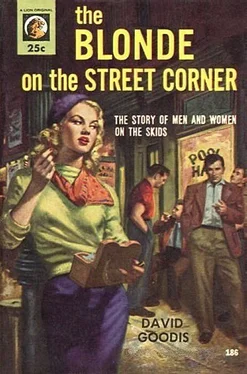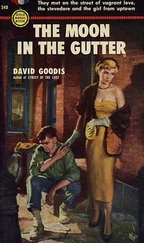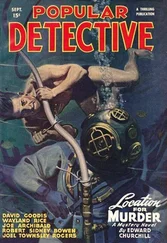“Where’s Dippy now?”
“Oh, he’s home. He’s all right. You can’t hurt that guy. You should have seen him coming home in the subway. He made a speech in the subway. He told everybody that he was hit in the head while saving the life of the mayor when a truck ran out of control near City Hall. You should have heard him. So finally we get him home and George stayed there last night.”
“Let’s go over there,” Ralph said.
“All right, wait a minute. I just want to finish this idea.” Ken swung around on the stool and lit another cigarette and leaned close to the music he had written. He pecked out a few more notes and then he shook his head. He put down the pencil. He muttered and hummed and hit a few chords and then he started to play his song.
“What’s that?” Ralph said.
“Just an idea,” Ken murmured. He hit a few more chords, banged hard on the first few bars of the song. “I gotta develop it.”
“It sounds funny.”
“It’s not funny,” Ken said, becoming angry.
“Don’t get sore,” Ralph said. “It just sounds that way to me.”
“Listen to this,” Ken said. He went on with the song. Half-way through, he broke off and went back to the beginning. Again he swung around on the stool. His voice was low as he said, “Listen — I want you to listen to this. I want you to tell me just what you feel when you hear it. Just keep your mind on it and listen carefully.”
He banged his preliminary chords and then the music was slow and he was digging into the song. Ralph stood at the side of the piano and looked at the floor. Music crawled around the room. It slipped down a hill of sound and slowly made its way back again and when it reached the summit it slipped once more. And it kept slipping, trying to gain a foothold but slipping nonetheless and going down and down and down and finally cracking hard and spreading out and dying.
Ken sat there, his arms limp at his sides.
Ralph looked at the floor.
Ken said, “I’ve got something here. I know I’ve got something. Just the rough idea, but I’m going to develop it.” He was talking to himself. He looked up and he said, “Well?”
“I’ll think up some lyrics.”
“The lyrics are unimportant. You can do them when I finish working on the tune. I got something here. I know it. At this time of year all the big shots are down in Florida. I’ll take these tunes with me so the right people can hear them. That’s the only way. That’s the only way a guy can get anywhere. He’s gotta know somebody. He’s gotta have an in. What’s the use of kidding myself? No matter how good a guy is, if he doesn’t have an in he’s up the creek. I’m gonna finish this tune and I’m going down there and get in with the big boys.” He was muttering now. He turned around on the stool and his long fingers jabbed at the keys again. And he was playing his song again, soft now, and his voice writhed among the notes as they climbed, and slipped, down and down and down, slipped down. His voice, slipping down with the slipping melody, “When I was a kid my old lady figured that one day I would be a great pianist. I remember when I was nine years old I started taking lessons and the guy told her I had a lot of talent and she put out six bits a week for me to learn the piano.” The music, slipping down, trying to grab at something but slipping. He said, “I liked it. At first. I could sit at the piano for hours. I didn’t like the scale exercises. It used to be that I would stop looking at the notes and get my own ideas and play that way. It got so I didn’t want to take any more lessons and I didn’t want to look at the notes. I wanted to use my own ideas. I started to write songs. I wrote a lot of songs. I tore them up, all of them. I’m glad I tore them up. They really weren’t any good. If I do it, it’s got to be good. If it’s not good I’ll tear it up. I only want to put out songs that are really good. This one I know is good.” He banged hard on the keys, and his voice rose. Then the next chord was subdued, and his voice faded with the chord, slipping down, and he was saying, “But what’s the use? Even if it’s good I’ve got to fake my way in. And even then — what will happen? Nothing. What’s the use? You do something good, you eat your heart out trying to make it as good as you know how, and then you gotta be a phony to put it across. You gotta grease your way in with the big guys. Then even after that — what happens? What happens to you? After you take something right out of yourself, right out of your insides, and you put it in a song, and you sweat blood making it as good as you know how, and then you shine their shoes and manage to get them to listen to it, maybe you make a couple of dimes. That is, if you’re especially lucky.”
His forefinger wearily rippled the keys, and the song was ended.
He sat there, staring at the keys.
Ralph said, “You’re going to work on it some more?”
“Sure. I’m going to work on it until I’ve got it just the way I want it. Then you go to work on the lyrics.”
They walked out of the house, into the grey cold. It was raining again, and the rain was turning to snow. Slush was on the street. Rain and clusters of half-frozen rain dripped from the trees.
They arrived at Dippy’s house. The front door was open. There was a light in the breakfast room. They could hear George laughing. They walked into the breakfast room. Dippy was on the phone. He had a strip of adhesive on his forehead. He was leaning over the phone table in deep concentration.
From upstairs there came the clatter of women’s voices.
“What’s that?” Ralph said.
“Dippy’s old lady and his sister-in-law are having a fight. It’s been going on all morning,” George said.
Dippy turned from the phone. A feminine voice cricketed at the other end of the wire. Dippy smiled at Ralph and pointed at the adhesive on his forehead. Then he turned, and into the phone he said, “You mean you can’t arrange it for tonight?”
He listened attentively to the answer and then he banged the receiver down.
“What did she say?” George said.
“She can’t arrange it for tonight,” Dippy said.
“Why’d you bang the receiver down?” Ken said.
Dippy shrugged. “I didn’t have anything more to say.”
“Well, couldn’t you at least say good-bye?” Ken said.
Dippy picked up the telephone book and turned pages. “Saying good-bye is a waste of time. I’ll call that number again on Tuesday night. That’s what I’ll do. She’ll make a party for us for Saturday night. I’ll have another party on Thursday. I’ll have a party tonight. I’m just trying to find this number in South Philly. I got a date for myself for tomorrow night. I got one for Wednesday night and maybe I’ll have one for Tuesday. That leaves me open for Friday. Friday I’m open for ideas.”
George said, “He’s got a date every night this week.” He turned to Dippy. “You must be in the bucks to have a date every night this week. Let’s see your bankroll.”
Dippy put a hand in his pocket and took out thirty-seven cents. They all smiled.
“This will see me through,” Dippy said. “Of course, if my finances don’t hold out I’ll have to break the dates. But this cash will be sufficient. I’ll only spend carfare one way.”
“How will you get home?” Ken said.
“The girl will lend me money. I’m honest.”
The guys laughed.
Dippy turned the pages of the telephone book.
Upstairs the yelling was louder.
“Listen to them,” George said.
Ken laughed. “What’s it about this time?”
Dippy turned the pages of the telephone book. “I don’t know,” he said. “I never know what it’s about.”
“Let’s go in the living room where we can hear better,” Ken said.
Читать дальше












